Best Notion Alternatives: Our Top 5 Picks For Replacing Notion
Notion is one of a kind. It combines note-taking, wiki, database, task management, and project management features into an all-in-one productivity tool.
But despite its versatility, Notion might not be the ideal solution for every team. Here are some alternatives that might better suit your needs.
Potential Drawbacks of Notion
We’re big fans of Notion: This platform has landed in our top 5 project management tools tools because it uniquely combines document, wiki, and task management features into one versatile hybrid platform. With Notion, you can manage way more than just projects – some users even organize their entire lives with it.
However, this doesn’t mean that Notion is the answer to everything or the perfect solution for all needs. The platform does have some drawbacks:
Not focused solely on project management
Notion offers robust tools for managing tasks and projects, but project management is just one of many things it can do. If you’re after a tool laser-focused on project management, Notion might not be the perfect fit.Can be overwhelming for beginners
The customization options in Notion are so extensive that users — especially newbies — might not know where to start.Lengthy setup time
Getting Notion to perfectly match your organization’s needs can take a while, since its processes and interfaces aren’t as predefined as other platforms.Limited real-time communication
While you can collaborate on documents, Notion isn’t great for direct communication like chats or group messages.Lack of reporting features
As an all-in-one platform, Notion pulls together a lot of important data. But when it comes to generating custom reports, its built-in tools fall short.No form features
Notion lacks a built-in form builder, so you can’t collect data from team members, clients, or other user groups and directly convert it into tasks.Free version limitations
Notion’s free plan is solid, but it has some limits. File uploads are capped at 5 MB, and the number of blocks on team pages is restricted.
If you’re after a productivity tool that helps you manage not just projects but also your ideas, tasks, and notes, Notion is a fantastic choice.
However, if Notion feels like it’s trying to juggle too many things at once or doesn’t quite hit the mark for your specific needs, you might need to look for an alternative – but which one?
Notion Alternatives: Our TOP 5
Choosing the right Notion alternative depends on what you love about Notion and what features you can live without.
Since Notion blends project management with a knowledge database, our top 5 alternatives cover both areas.
ClickUp: The All-Rounder with a Stronger Project Management Focus

ClickUp* might not look much like Notion on the surface, but it shares a similar all-in-one philosophy: ClickUp aims to combine as many features as possible from different areas into a single, integrated platform.
The big difference? Unlike Notion, which is a knowledge database with secondary project management features, ClickUp flips the script. Here, project and task management take center stage, with note-taking and documentation features complementing the mix.
What We Like About ClickUp
When it comes to classic project management features, ClickUp is top-notch. The platform supports almost all the essential views and task functions, with nearly every setting and interface being highly configurable. You can enhance its native tools with numerous integrations, automations, and templates.
Despite the plethora of options, ClickUp remains user-friendly, thanks to its logical structuring and data hierarchy. Projects are organized in different Spaces and folders, where you can set individual rules and access rights. This allows precise control over your projects at various organizational levels.
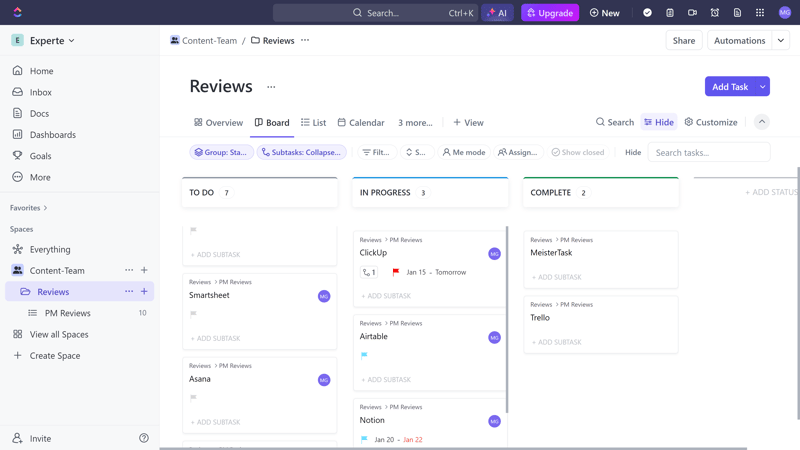
ClickUp has a stronger project management focus than Notion.
What ClickUp Does Better Than Notion
If you're looking for a dedicated project management tool but don't want to entirely give up note-taking and documentation features, ClickUp might be an interesting alternative to Notion. Here are some advantages:
Stronger focus on project management
ClickUp is primarily designed as a project management platform. Its structure and basic features are all geared towards organizing projects and their data.Good balance of customizability and fixed structures
ClickUp dashboards are less customizable than Notion pages but offer more versatility within their fixed structures compared to other project management tools. ClickUp strikes a good middle ground.Integrated time tracking and reporting
ClickUp comes with built-in time tracking to monitor your team’s working hours. Reporting tools are also part of the package.Real-time collaboration
ClickUp boasts more collaboration tools than Notion and offers real-time document editing, whiteboards, and group chats.
Where Does ClickUp Fall Short Compared to Notion?
Notion's powerful page editor is a standout feature, while ClickUp’s document features are more of a sideshow. They’re simpler and don’t offer the same depth or flexibility in content design and structuring.
Notion is generally more adaptable: you can combine almost any type of content on a page and organize it intuitively, while ClickUp, despite its extensive customization options, follows more fixed paths.
This makes Notion especially valuable for creating knowledge databases and extensive documentation.
Other Drawbacks of ClickUp
Since ClickUp markets itself as “One app to replace them all,” it invites comparisons with all other programs. This also highlights some weaknesses of the platform:
Complex interface, steep learning curve
ClickUp isn't as user-friendly as other project management platforms. The interface is dense with information due to its many features and configuration options, which can be overwhelming for beginners.Performance issues
ClickUp isn’t as fast as we’d like. The interface can be sluggish due to the numerous functions, occasionally causing lag, which can be frustrating in daily project work.Under-developed features
Like other all-in-one solutions, ClickUp suffers from having some features that exist just to check a box and can’t quite match the offerings of dedicated programs.
Slite: Notion Lite
You really like Notion's knowledge management features, but find the platform a bit too complex? In that case, Slite is worth a look. This collaborative documentation tool is much more streamlined than Notion; it lacks comprehensive project management features — but is much easier to master.
What We Like About Slite
Slite shines with its simple, well-structured user interface, making it easy for new users to get up to speed. The ability to organize content in channels and group information by themes keeps everything tidy and gives team members a clear overview of all relevant areas.
You can create Slite pages using the platform’s user-friendly document editor or choose from a solid selection of templates for various purposes (e.g., OKRs, product planning, employee handbook). Plus, Slite offers plenty of integrations to connect the platform with other solutions.
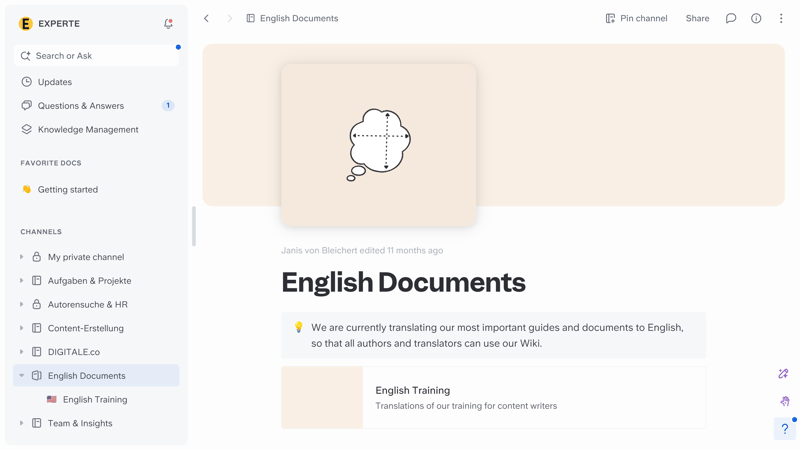
Slite focuses primarily on knowledge management and leaves project management to other tools.
What Slite Doe Better Than Notion
Slite can't resist taking a swipe at Notion, calling the competitor a “generic all-in-one solution that slows teams down” on its website.
Compared to Notion, Slite doesn’t aim to be an all-encompassing tool. It deliberately skips features that go beyond its core functionality, especially in project management, to deliver a more focused user experience.
Easier to use and set up
Slite is less complex than Notion, making it easier to get started and use overall. New team members should be able to effectively use the platform after a brief onboarding.Tighter focus on documents
Slite does not claim to be a project management tool; instead, it integrates with dedicated tools for that purpose. This keeps the Slite interface more compact and less cluttered.Built-in AI features
Slite's integrated AI assistants crawl all Slite documents to provide smart answers at lightning speeds.
Where Does Slite Fall Short Compared to Notion?
Notion can do almost everything Slite can, and then some. With Notion, you can create and organize nearly any type of content, from simple notes to complex databases to project management views – all at a similar price.
So if you’re looking for an all-in-one app to manage all your data, information, and tasks in one central dashboard, Notion remains the go-to choice.
Other Drawbacks of Slite
If you can dish it out, you’ve got to take it. Here are more disadvantages of Slite:
Limited features
Slite is less flexible than other platforms. If you need complex databases, advanced customization options, or project management features, Slite might not be enough.No free plan
Slite offers a 14-day trial, but not a free plan. The previously available free plan, limited to 50 documents, has unfortunately been discontinued.AI search doesn't always work
Like all AI tools, Slite's doesn't always yield the desired results.
monday.com: User-Friendly Project Management All-Rounder

With monday.com*, we return to classic project management tools. It supports teams of various sizes and industries in planning, managing, and executing projects, as well as handling project and other data.
In our comparison of the best project management platforms, monday.com claimed the top spot, thanks to its impressive blend of flexibility and user-friendliness.
What We Like About monday.com
monday.com might not be as versatile as Notion since it focuses more on project and task visualization, but in its core mission, it excels. You can visualize your boards with all essential views, customize datasets and tasks extensively, and control workflows with milestones, subtasks, and dependencies.
Setting up boards and views is a breeze in monday.com’s vibrant interface. Project structures and hierarchies are logically organized, so even beginners should quickly get their bearings and be able use all the basic features.
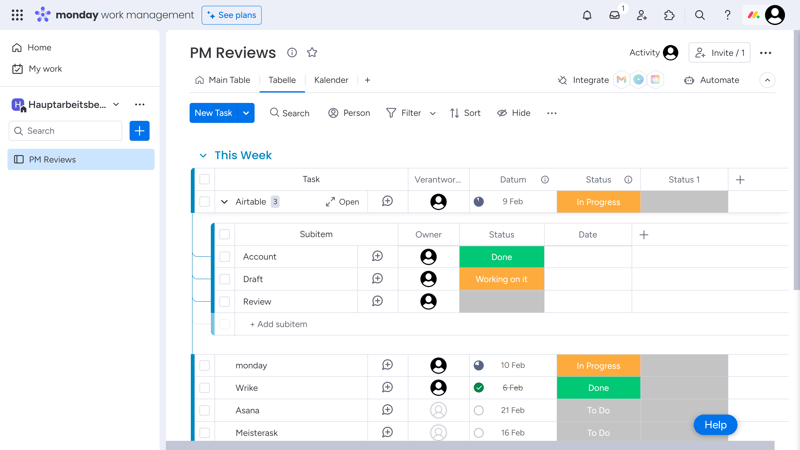
monday.com took first place in our ranking.
What monday.com Does Better Than Notion
monday.com is a great Notion alternative if you're seeking a more structured project management experience, as long as you can live without extensive note-taking and documentation features.
Emphasis on project management
monday.com is primarily designed as a project management tool. This simplifies setup because almost all tools are developed for managing projects, tasks, and teams, resulting in a more cohesive task management experience.More intuitive for teams
With its fixed workflows and structures, monday.com’s interface is more intuitive for teams – especially when team members just need to “work through” assigned tasks while a project manager handles the behind-the-scenes work.Additional project management features
monday.com offers a few features that Notion lacks, such as advanced reporting tools, a form builder, and integrated time tracking.
Where Does monday.com Fall Short Compared to Notion?
monday.com isn’t a replacement for Notion if you need a platform for notes, documentation, and knowledge management. As an all-in-one workspace for flexible organization of information, Notion has much more to offer; monday.com is more focused on traditional project management.
Other Drawbacks of monday.com
monday.com might be our top choice for project management, but it's not ideal for everyone. Some of its downsides include:
Limited communication features
You’ll miss out on real-time communication channels like chats or private messages with monday.com; platforms like ClickUp are much better equipped in this regard.Cost and paywalls
monday.com is pricier than Notion, and many basic features and views (Chart view, time tracking, and form columns) are only included in the most expensive plan.Limited free version
The free plan of monday.com could be more generous: it’s limited to 200 items and a maximum of two team members.Not for individual users
For individuals (e.g., freelancers), only the free version of monday.com is feasible, as the premium plans require at least three licenses. Notion’s premium plans, on the other hand, are appealing even for solo users.
Slab: Sleek Wiki for Teams
Like Slite, Slab doesn't try to do everything. This knowledge-management platform is designed to help teams effectively organize and share insights and data.
What We Like About Slab
Slab offers a user-friendly interface where team members can easily create and manage documents and information. The Slab editor provides basic formatting options to create visually appealing wiki pages, which can also be shared with external users.
A central search feature that includes both Slab content and integrated solutions (e.g., Slack or Google Workspace) helps team members quickly find the right results.
All this makes Slab an intuitive, lightweight “single source of truth” for company documents.
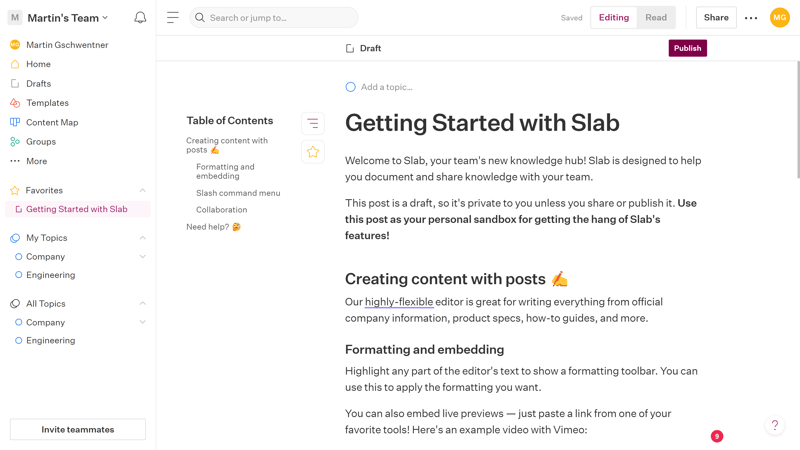
Slab is a user-friendly knowledge management platform.
What Slab Does Better Than Notion
Slab also takes a swipe at Notion on its website, criticizing its one-size-fits-all approach. Like Slite, Slab has some advantages due to its specialization in wikis:
Tighter focus
Slab isn't trying to be a project management tool; it focuses 100% on knowledge management. If you're looking for a dedicated wiki platform (and use other tools for project management purposes anyway), Slab offers a more targeted user experience.Gentler learning curve
Slab’s simpler structure and less cluttered interface mean new team members can get up to speed quickly.Content verification
Slab combats outdated information with a verification feature: you can assign documents to specific team members to ensure the content remains current and relevant.Powerful search feature
Slab's search tool doesn't just crawl content stored in your Slab documents, but also anything saved in integrated tools. To date, Notion doesn't offer anything comparable.
Where Does Slab Fall Short Compared to Notion?
Notion's all-in-one approach might not be ideal for everyone, but if you prefer a comprehensive platform for project management, notes, and knowledge management all in one, Notion is the better choice.
Notion’s learning curve might be steeper, but learning the basics shouldn't be too much of a problem. Once mastered, it offers nearly all the features found in Slab, plus many more.
Other Drawbacks of Slab
Of course, Slab has a few more weaknesses:
Less versatile than other tools
The focus on knowledge management makes Slab less versatile than hybrid platforms, which offer extensive capabilities for notes, task management, database management, and more.No project management features
Slab is no substitute for project management tools like monday.com or Asana. If you need project management, you’ll have to use an additional tool, which increases software costs.Limited collaboration tools
Slab supports commenting and real-time document editing, but little else in terms of collaboration.
Asana: Process-Based Project Management With a First-Class Interface

Asana* shares more similarities with monday.com and ClickUp than with Notion. Created by ex-Facebook staffers, this productivity platform focuses predominantly on project management. Its goal is to minimize “work about work” by making administrative tasks and work processes as seamless and straightforward as possible.
What We Like About Asana
Asana impresses with a modern and responsive interface that makes project management dynamic and easy for everyone involved. With Asana, standard processes, such as checking off to-dos and breaking down complex processes into subtasks, just “flow”.
But Asana offers more than just a polished surface: beneath the hood, you’ll find almost all the tools necessary for effective task and project management. We especially like the automation interface, where you can visually and intuitively build rules and workflows on a kind of workbench.
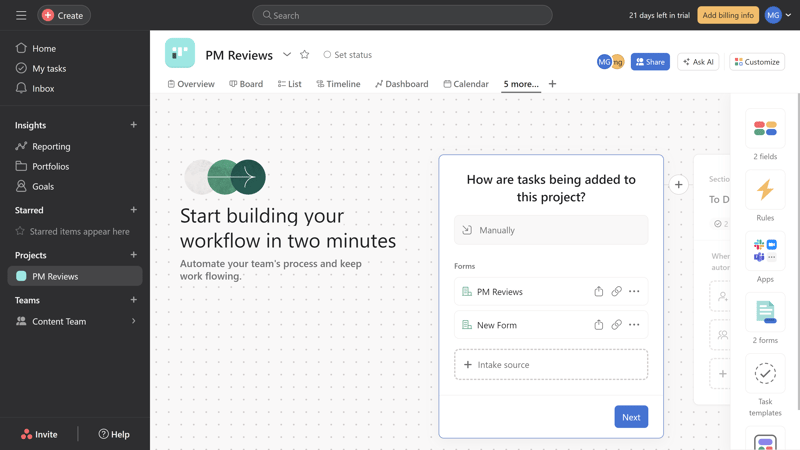
Asana’s user interface is one of our favorites.
What Asana Does Better Than Notion
Like monday.com, Asana is a viable Notion alternative if you’re primarily looking for a tool for project management and task organization. Here’s where Asana excels:
Specialized in project management
Asana focuses primarily on project management, with a strong emphasis on task management, work distribution, and workflows. It also offers planning, monitoring, and reporting features, making it a great choice for complex projects.Process-driven
Asana is more process-oriented than other platforms – whether it’s Notion, ClickUp, or monday.com. Workflows and task sequences are particularly dynamic in Asana.Intuitive automations
Asana's workflow builder is one of the best on the market. Its visual interface makes creating automations and rules especially intuitive.Powerful reporting features
Asana offers impressive reporting tools, which Notion lacks. With these, you can visualize project data in real-time charts and dashboards.
Where Does Asana Fall Short Compared to Notion?
Asana's focus on processes and workflows makes it less versatile than Notion and other providers. You can only store and arrange your information within predefined structures, and there are no extensive note-taking or wiki functions.
Asana is thus a pure project management tool, best suited for visualizing workflows and organizing tasks but less flexible in other areas.
Other Drawbacks of Asana
Compared to its competitors, Asana has some disadvantages, such as:
More rigid
Asana is not as versatile as other tools, especially Notion and ClickUp. Dashboards and processes are more predefined, and the selection of custom fields is limited.Fewer collaboration features
Asana is mainly suitable for asynchronous collaboration with comments and assignments. Don't expect a chat feature or advanced collaboration tools.No solo/single-user premium subscription
Asana also excludes solo users by requiring at least two licenses to use the premium plans. This is disappointing since Asana does have a lot to offer freelancers.
More Notion Alternatives
Of course, there are many other project management tools that might make great alternatives to Notion. You can find the complete ranking of the eleven platforms we tested here:
Conclusion
Finding a replacement for Notion is tough – because it combines so many different tools into one. This all-in-one approach can also be a drawback, however, because dedicated solutions are often better tailored to specific use cases.
If you’re looking for a project management solution focused on managing projects, tasks, and workflows, tools like ClickUp, monday.com, and Asana are worth a look.
You can read detailed reviews of these and other providers in our comparison of the best project management tools.
FAQs
Notion is an all-in-one organization tool for creating and managing notes, knowledge databases, projects, tasks, and more. It combines elements of notebook apps, task management tools, and database software into one central workspace, which can be customized with flexible pages.
Notion is suitable for a wide range of users – from individuals needing a place for personal notes and task management to teams and businesses managing complex projects, company-wide knowledge databases, and collaborative document editing. This flexibility makes Notion a versatile organization tool for various use cases.
The best Notion alternative depends on your needs. If you’re looking for a project management tool, consider providers like ClickUp, monday.com, and Asana. They offer a stronger focus on project management and more comprehensive task features, but are less suited for document management. For wiki and knowledge management, platforms like Slab and Slite are great alternatives. While they may not have Notion’s extensive features, they are simpler and easier to learn.
























